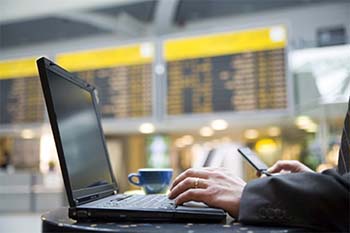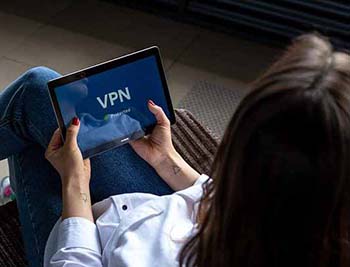How to Use Public WiFi Safely

In This Article
• What is public WiFi?
• What are the risks?
• Tips to use it safely
• Helpful free resources
(No time to read right now? Just want to see the list of things to know? Here you go.)
It's easy to get online with free wireless Internet, but there are risks you should know about. We'll explain what public WiFi is, why it can be dangerous, but also how you can use it safely.
What are public WiFi hotspots?
A public WiFi connection (called a “hotspot”) is a way to connect your phone or laptop to the Internet. Hotspots are often provided for free by hotels, merchants, libraries, airports, and others as a convenience to customers and visitors.
But connecting to these networks can be dangerous.
Why is public WiFi potentially dangerous?
You can't control or configure its settings: WiFi transmitters are just tiny computers that can be attacked by hackers just like regular computers.
It's easy for a hacker to set up a fake hotspot:. The name of a WiFi network can be set to anything, so just because it's called “Hilton Hotel WiFi” or “Free Airport WiFi” does not mean it's run by the hotel or airport. If a hacker can get you to connect to his (fake) hotspot, he can watch everything you do online. Encryption is a way of scrambling data going between your device and the Internet. It makes it much harder for someone to snoop and see what you're doing.
You can't set the encryption level on the connection: (see box) Without good encryption, even on a legitimate hotspot, there are things visible to a hacker.
How can we use public WiFi safely?
Since we don't want to give up the convenience of public WiFi, let's focus on the things we can do to protect ourselves…
1 Assume there is NO (or weak) security on the WiFi hotspot. Don't do anything while connected that you wouldn't shout out loud or write on a postcard.
2 Ask the coffee shop, hotel, merchant, airport employee, etc. what the real WiFi network is called and make sure to connect only to legitimate hotspots.
3
 Be wary of hotpots that don't require a password or popup page. Having to provide a password or click in a popup is generally a good sign you're on a legitimate hotspot.
Be wary of hotpots that don't require a password or popup page. Having to provide a password or click in a popup is generally a good sign you're on a legitimate hotspot.
4 If you have unlimited data on your cell phone (and a decent cell signal) you can set up your own phone as a WiFi hotspot! Use that if possible and you'll be much more secure. (For instructions, just Google “how to use [your phone model here] as a WiFi hotspot”.)
5 When you're done using the pubic WiFi, “forget” the network on your phone or laptop. How to do this varies by device, so just Google “how to forget WiFi network on [your type of phone or computer here]”. This will prevent automatic reconnection to that network in the future, which is safer.
6 In an office environment (as an employee or visitor) be aware that everything you do online while connected to its hotspot can be seen by company administrators.
7
Restrict personal and/or sensitive activities when connected to public WiFi.  Do not log into a financial institution, an eCommerce website, or your email until you're on a “known safe” WiFi connection such as in your home. Never provide your credit or debit card information to any website while connected to public WiFi.
Do not log into a financial institution, an eCommerce website, or your email until you're on a “known safe” WiFi connection such as in your home. Never provide your credit or debit card information to any website while connected to public WiFi.
8 Keep your Operating System (see note below) and applications updated. We know it's a hassle to keep updating things, but those updates often contain security improvements that are meant to protect you.
9
Make sure you have a secure browser connection. You should see an “s” at the beginning of the web address so it looks like “https”.  A free browser addon called HTTPS Everywhere can help you browse securely.
A free browser addon called HTTPS Everywhere can help you browse securely.
10 Use other browser addons such as uBlock Origin and Privacy Badger. These automatically prevent some websites from sending potentially malicious content and tracking your activities. (See “Free Resources” below)
11
We saved the *best* tip for last! Use a VPN. A virtual private network (VPN) is software that provides a more secure and private Internet connection.  There are free and paid VPNs available for phones and computers.
There are free and paid VPNs available for phones and computers.
We're preparing a detailed article to help you decide which VPN is best for you, so check back later (or sign up for our free newsletter to be notified when the article is ready.)
Want More Info Like This?
Get our Free Newsletter
Note on Operating Systems
An operating system is the underlying software that runs your device. On phones, it's typically iOS or Android. On computers, it's usually Microsoft Windows or Apple MacOS. Details on how to update these are beyond the scope of this article, but if you want guidance, just get in touch.
Free Resources
• HTTPS Everywhere — HTTPS Everywhere is a browser addon provided by the EFF (see below) that encrypts your communications with many major websites.
• Privacy Badger — Privacy Badger is a browser addon provided by the EFF (see below) that blocks invisible trackers on websites.
• uBlock Origin — uBlock Origin is a browser addon that filters out potentially malicious web content, advertisements, and activity trackers. Available for Google Chrome, Mozilla Firefox, and Microsoft Edge web browsers.
• Electronic Frontier Foundation (EFF) — The EFF is a non-profit organization that defends digital and online privacy. .
Click here for more free resources.
